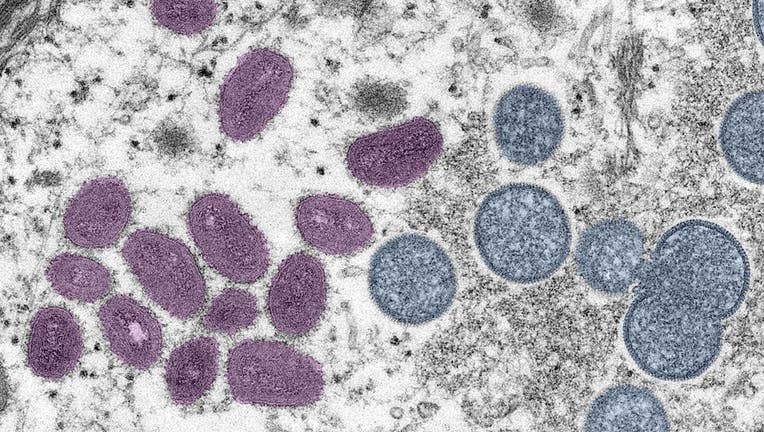Monkeypox in Georgia: CDC sees new spike in cases as virus spreads

Digitally-colorized electron microscopic (EM) image depicting a monkeypox virion (virus particle), obtained from a clinical sample associated with a 2003 prairie dog outbreak, published June 6, 2022. The image depicts a thin section image from a huma
ATLANTA - The number of confirmed monkeypox cases in Georgia has more than tripled in over a week.
According to a representative with the Georgia Department of Public Health on Tuesday, the state has reported 41 cases of the virus.
That's over three times as many as a week ago, when the CDC said the Peach State had 13 patients who had contracted the virus.
Georgia's number of cases puts it at the state with the seventh-highest number of cases in the United States - much less than New York's 156 cases or California's 148, but more than the majority of the states which only have a handful.
While health officials have not released information about the new cases, the previous confirmed infections were found in men who live in the metro Atlanta area and were not believed to have had contact with each other. All the patients have been asked to isolate and are being monitored by the Georgia Department of Public Health.
As of Tuesday, only 11 states have not reported a case of monkeypox. The latest states to announce an infection are Tennessee, Kansas, and West Virginia. The total number of confirmed cases in the United States is 866.
The first case in Georgia of the virus was confirmed in early June.
Saturday, the Fulton County Health Department gave out about 200 doses of the monkeypox vaccine to hopefully prevent a potential outbreak.
Those doses with limited only to men who had same-sex partners in the two weeks prior to the shots and quickly were all booked.
What is monkeypox?
Most monkeypox patients experience only fever, body aches, chills and fatigue. People with more serious illness may develop a rash and lesions on the face and hands that can spread to other parts of the body.
MONKEYPOX: WHAT YOU SHOULD KNOW AS THE DISEASE SPREADS AROUND THE WORLD
The disease is endemic in parts of Africa, where people have been infected through bites from rodents or small animals. It does not usually spread easily among people.
Last month, cases began emerging in Europe and the United States. Many — but not all — of those who contracted the virus had traveled internationally. Most were men who have sex with men, but health officials stress that anyone can get monkeypox.
Case counts have continued to grow. As of Tuesday, the U.S. had identified 306 cases in 27 states and the District of Columbia. More than 4,700 cases have been found in more than 40 other countries outside the areas of Africa where the virus is endemic.
There have been no U.S. deaths and officials say the risk to the American public is low. But they are taking steps to assure people that medical measures are in place to deal with the growing problem.
A two-dose vaccine, Jynneos, is approved for monkeypox in the U.S. The government has many more doses of an older smallpox vaccine — ACAM2000 — that they say could also be used, but that vaccine is considered to have a greater risk of side effects and is not recommended for people who have HIV. So it’s the Jynneos vaccine that officials have been trying to use as a primary weapon against the monkeypox outbreak.
So far, the government has deployed over 9,000 doses of vaccine. In June U.S. officials said they are increasing the amount of Jynneos vaccine they are making available, allocating 56,000 doses immediately and about 240,000 more over the coming weeks. They promised more than 1 million more over the coming months.
"We will continue to take aggressive action against this virus," said Dr. Ashish Jha, White House COVID-19 response coordinator, who has also been playing a role in how the government deals with monkeypox.
The administration said it was expanding the pool of people who are advised to get vaccinated to include those who may realize on their own that they could have been infected. That includes men who who have recently had sex with men at parties or in other gatherings in cities where monkeypox cases have been identified.
Anyone with a rash that looks like monkeypox should talk to their healthcare provider, even if you do not believe you have had contact with anyone who has contracted the virus.
The Associated Press contributed to this report.

